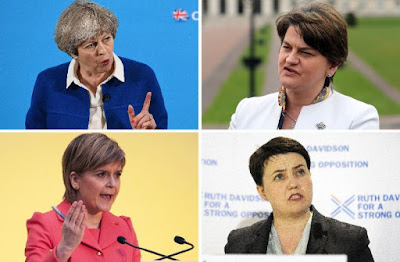Yahoo – AFP,
Florence BIEDERMANN, June 12, 2017
London
(AFP) - In the high-stakes political chess game that has followed Britain's
confusing general election, four women will be making the next moves.
Two of them
-- Prime Minister Theresa may and Scottish First Minister Nicola Sturgeon --
are on the back foot following heavy electoral losses.
The other
two are on the rise -- Arlene Foster, head of the ultra-conservative Democratic
Unionist Party, and Scottish Conservative leader Ruth Davidson.
Theresa
May
Britain's
first female prime minister since Margaret Thatcher, who governed from 1979 to
1990, May has distanced herself from the legacy of the "Iron Lady".
The current
premier's rein is also likely to be considerably shorter, after May's decision
to call an election three years early dramatically backfired when the
Conservatives lost their majority.
An advocate
of a "hard" Brexit, committed to Britain leaving the European single
market and cutting immigration from the bloc, May ran a campaign focused on her
supposedly "strong and stable" leadership ahead of negotiations
starting with Brussels.
But she
failed to inspire voters and came under criticism for appearing cold and stiff,
lacking the personal touch despite her high popularity ratings at the start of
the election campaign.
The
60-year-old vicar's daughter has created an association to promote women in
politics and she has boasted of being an inspiration to others, but rarely
opens up about her personal motivations.
Nicola
Sturgeon
The first
female leader of the Scottish National Party, Sturgeon has seen her plans for a
second independence referendum shaken by the election results which saw her
party lose 21 of its 56 seats.
A lawyer by
trade who grew up in a working class family, she has championed herself as the
voice of the 62 percent of Scots who voted last year to remain in the European
Union.
Sturgeon,
46, has appealed to Scotland's pro-European sentiment to call for an
independence referendum despite voters rejecting such a breakaway in 2014.
A frequent
critic of everyday sexism in political life, she recently said women have a tougher
time when making media appearances.
"Every
time a woman politician goes in front of a camera, there are maybe 100 things
that she has to worry about, consciously or subconsciously, that a man will
never have," she told the Gentlewoman magazine.
Some
reporters are "only interested in our shoes", she added.
Ruth
Davidson
The head of
the Scottish Conservatives, Davidson saw her party gain a dozen seats in the
general election.
That was in
part down to her opposition to Sturgeon's calls for another independence
referendum.
Cutting a
charismatic and jovial figure, the 38-year-old has brought a breath of fresh
air to Scottish politics and offers an alternative to the nationalist narrative
of the SNP.
Davidson is
engaged to her Irish partner Jen Wilson and is an outspoken advocate for gay
marriage.
A unionist
politician who boasts kick-boxing skills, Davidson backs a "soft"
Brexit in opposition to May's "hard" approach to Britain's EU
divorce.
"When
I was growing up the two most important people in the country were the Queen
and Margaret Thatcher, so I thought women could do anything," Davidson
told AFP.
Arlene
Foster
The first
woman to lead the Northern Ireland executive in January 2016, Foster saw her
Democratic Unionist Party win 10 seats in Thursday's vote.
Despite
being head of a small unionist party, Foster will play an instrumental role in
Westminster as May has sought the DUP's help to tip the Conservatives into a
parliamentary majority.
The two
parties have some common ground and Foster is pro-Brexit, although cautious of
preventing a hard border being imposed between Northern Ireland and the
Republic.
Foster's
politics has been influenced by her experiences during the Northern Ireland
conflict.
Her father
was shot in the head but survived an attack by Irish Republican Army
paramilitaries when she was just eight years old and her school bus was blown
up when she was 16.
Reflecting
on her role as a woman in politics, Foster said self-belief was vital.
"It's
a bit like breaking down old conservative barriers -- one has to believe in
oneself, and your ability to move forward," she told AFP.












No comments:
Post a Comment
Note: Only a member of this blog may post a comment.